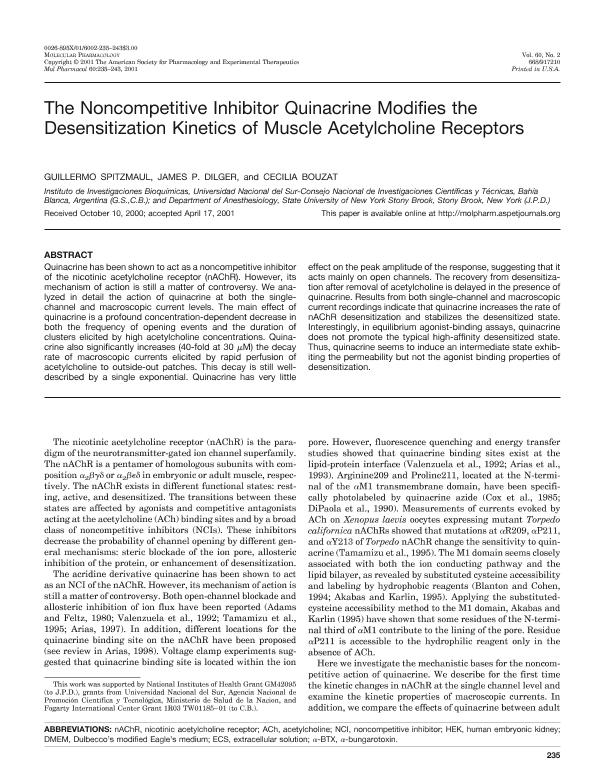Mostrar el registro sencillo del ítem
dc.contributor.author
Spitzmaul, Guillermo Federico

dc.contributor.author
Dilger, James P.
dc.contributor.author
Bouzat, Cecilia Beatriz

dc.date.available
2018-07-25T17:40:58Z
dc.date.issued
2001-08
dc.identifier.citation
Spitzmaul, Guillermo Federico; Dilger, James P.; Bouzat, Cecilia Beatriz; The noncompetitive inhibitor quinacrine modifies the desensitization kinetics of muscle acetylcholine receptors; American Society for Pharmacology and Experimental Therapeutics; Molecular Pharmacology; 60; 2; 8-2001; 235-243
dc.identifier.issn
0026-895X
dc.identifier.uri
http://hdl.handle.net/11336/53094
dc.description.abstract
Quinacrine has been shown to act as a noncompetitive inhibitor of the nicotinic acetylcholine receptor (nAChR). However, its mechanism of action is still a matter of controversy. We analyzed in detail the action of quinacrine at both the single-channel and macroscopic current levels. The main effect of quinacrine is a profound concentration-dependent decrease in both the frequency of opening events and the duration of clusters elicited by high acetylcholine concentrations. Quinacrine also significantly increases (40-fold at 30 μM) the decay rate of macroscopic currents elicited by rapid perfusion of acetylcholine to outside-out patches. This decay is still well-described by a single exponential. Quinacrine has very little effect on the peak amplitude of the response, suggesting that it acts mainly on open channels. The recovery from desensitization after removal of acetylcholine is delayed in the presence of quinacrine. Results from both single-channel and macroscopic current recordings indicate that quinacrine increases the rate of nAChR desensitization and stabilizes the desensitized state. Interestingly, in equilibrium agonist-binding assays, quinacrine does not promote the typical high-affinity desensitized state. Thus, quinacrine seems to induce an intermediate state exhibiting the permeability but not the agonist binding properties of desensitization.
dc.format
application/pdf
dc.language.iso
eng
dc.publisher
American Society for Pharmacology and Experimental Therapeutics

dc.rights
info:eu-repo/semantics/openAccess
dc.rights.uri
https://creativecommons.org/licenses/by-nc-sa/2.5/ar/
dc.subject
Nicotinic
dc.subject
Receptor
dc.subject
Desensitization
dc.subject.classification
Otras Ciencias de la Salud

dc.subject.classification
Ciencias de la Salud

dc.subject.classification
CIENCIAS MÉDICAS Y DE LA SALUD

dc.title
The noncompetitive inhibitor quinacrine modifies the desensitization kinetics of muscle acetylcholine receptors
dc.type
info:eu-repo/semantics/article
dc.type
info:ar-repo/semantics/artículo
dc.type
info:eu-repo/semantics/publishedVersion
dc.date.updated
2018-07-11T14:11:31Z
dc.journal.volume
60
dc.journal.number
2
dc.journal.pagination
235-243
dc.journal.pais
Estados Unidos

dc.journal.ciudad
Baltimore
dc.description.fil
Fil: Spitzmaul, Guillermo Federico. Consejo Nacional de Investigaciones Científicas y Técnicas. Centro Científico Tecnológico Conicet - Bahía Blanca. Instituto de Investigaciones Bioquímicas de Bahía Blanca. Universidad Nacional del Sur. Instituto de Investigaciones Bioquímicas de Bahía Blanca; Argentina
dc.description.fil
Fil: Dilger, James P.. State University of New York; Estados Unidos
dc.description.fil
Fil: Bouzat, Cecilia Beatriz. Consejo Nacional de Investigaciones Científicas y Técnicas. Centro Científico Tecnológico Conicet - Bahía Blanca. Instituto de Investigaciones Bioquímicas de Bahía Blanca. Universidad Nacional del Sur. Instituto de Investigaciones Bioquímicas de Bahía Blanca; Argentina
dc.journal.title
Molecular Pharmacology

dc.relation.alternativeid
info:eu-repo/semantics/altIdentifier/url/http://molpharm.aspetjournals.org/content/60/2/235
dc.relation.alternativeid
info:eu-repo/semantics/altIdentifier/doi/http://dx.doi.org/10.1124/mol.60.2.235
Archivos asociados
